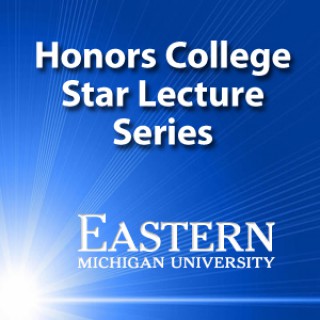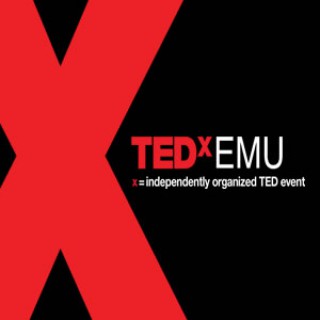
Honors College - Star Lecture Series
Follow Honors College - Star Lecture SeriesThe Star Lecture Series is presented by the University Honors College as a co-curricular experience that introduces university students to our faculty and their diverse research activities.
- Mar 18, 2015 LATEST EPISODE
- infrequent NEW EPISODES
- 39m AVG DURATION
- 27 EPISODES
More podcasts from Eastern Michigan University
Latest episodes from Honors College - Star Lecture Series

This interactive panel discussion provides multiple perspectives on the questions addressed from the previous presentations this academic year and offers all participants the opportunity to apply information from the series to their own planning for the future. The panel features: Rebecca Sipe, Ed.D., director of the EMU Honors College; Patrick Barry, M.A.; Reggie Barnes, M.A., director of diversity and community involvement; John Feldkamp, M.A., associate director of the EMU Honors College; Tuong-Vi Huynh, M.A., area complex director for EMU housing and residence life.

This interactive panel discussion provides multiple perspectives on the questions addressed from the previous presentations this academic year and offers all participants the opportunity to apply information from the series to their own planning for the future. The panel features: Rebecca Sipe, Ed.D., director of the EMU Honors College; Patrick Barry, M.A.; Reggie Barnes, M.A., director of diversity and community involvement; John Feldkamp, M.A., associate director of the EMU Honors College; Tuong-Vi Huynh, M.A., area complex director for EMU housing and residence life.

Improving the odds of a Life Well-Lived-Links betwen Health and Emotion - Part 1
Dr. Bluhm presents an overview of a newly emerging area of interest in the public health field that deals with the link between emotions and health. She also discuss the impact of stress, optimism and attitude on one’s health and ultimately on the ability to live life well.

Improving the odds of a Life Well-Lived-Links betwen Health and Emotion - Part 2
Dr. Bluhm presents an overview of a newly emerging area of interest in the public health field that deals with the link between emotions and health. She also discuss the impact of stress, optimism and attitude on one’s health and ultimately on the ability to live life well.

Manifestations of Poverty - Who Cares- The Cultural Politics of Indifference
This interactive session explores the impact of social policy and its role in intensifying the dismal effects of poverty and diminished opportunity on young people and thus our shared future. It also promotes speculation about how we might live otherwise through changed policy and renewed commitment.

Dr. Raymond explores the complex factors that contribute to personal health including access to health care, nutrition, exercise, community violence, pollution, and health literacy.

Dr. Raymond explores the complex factors that contribute to personal health including access to health care, nutrition, exercise, community violence, pollution, and health literacy.

Charity, Beneficence, or Justice? Americans’ moral relation to global poverty - Peter Higgins - Part 1
Most Americans, who live in a country in which absolute poverty does not occur, do not seem to regard severe global poverty as a pressing moral issue. Is it? The purpose of this talk was to examine whether or not Americans have a moral duty to contribute to global poverty alleviation efforts. Three views were critically assessed: (1) Americans have no such duty; contributing to global poverty alleviation efforts is mere charity—morally good but not required; (2) Americans have a positive moral duty to help the global poor to overcome their poverty; and (3) Americans have a negative moral duty of redress to contribute to global poverty alleviation efforts in virtue of participating in and benefiting from a global economic system that causes severe poverty.

Charity, Beneficence, or Justice? Americans’ moral relation to global poverty - Peter Higgins - Part 2
Most Americans, who live in a country in which absolute poverty does not occur, do not seem to regard severe global poverty as a pressing moral issue. Is it? The purpose of this talk was to examine whether or not Americans have a moral duty to contribute to global poverty alleviation efforts. Three views were critically assessed: (1) Americans have no such duty; contributing to global poverty alleviation efforts is mere charity—morally good but not required; (2) Americans have a positive moral duty to help the global poor to overcome their poverty; and (3) Americans have a negative moral duty of redress to contribute to global poverty alleviation efforts in virtue of participating in and benefiting from a global economic system that causes severe poverty.

Manifestations of Poverty: The Rich Get Richer and the Poor Get Prison - Part 2
Part 2 - Understanding poverty requires examining the inconvenient truths about economic inequality, which has a profound impact on people's lives but tends to be discussed less than race or gender. This interactive session reviewed the facts about the distribution of annual income, invited the audience to imagine a situation where they were going to be randomly assigned to a place in society and then reflect on what they believed a just distribution of wealth would look like, ultimately comparing those visions with reality. The second part of the presentation examined the implications inequality has for crime and criminal justice. The question was not just how inequality shapes the crimes of the poor, but also how it affects the crimes of the rich, as well as the likelihood that wrongdoers from either group will be arrested and sentenced to prison.

Manifestations of Poverty: The Rich Get Richer and the Poor Get Prison - Part 1
Part 1 - Understanding poverty requires examining the inconvenient truths about economic inequality, which has a profound impact on people's lives but tends to be discussed less than race or gender. This interactive session reviewed the facts about the distribution of annual income, invited the audience to imagine a situation where they were going to be randomly assigned to a place in society and then reflect on what they believed a just distribution of wealth would look like, ultimately comparing those visions with reality. The second part of the presentation examined the implications inequality has for crime and criminal justice. The question was not just how inequality shapes the crimes of the poor, but also how it affects the crimes of the rich, as well as the likelihood that wrongdoers from either group will be arrested and sentenced to prison.

It has been well established that health is influenced by factors outside of the person, including the opportunities and resources available and status in society. A growing body of literature in the occupational science community calls for occupational therapy practitioners to embrace and stand up for the individual rights, responsibilities, and freedoms embedded in a framework of occupational justice. People must have the opportunity "to experience meaning, participation, balance and choice in necessary or desired occupations." And yet healthcare practitioners continue to provide services within a medical model framework, focusing their interventions primarily on the person's underlying disability or condition. Is this ethical practice? Tax dollars and company revenues are spent to reimburse this narrowly focused approach to "health" care. If we can continue to get paid for it should we do it?

Psychologists' professional standards of conduct are based on general ethical principles. This session began with a brief general orientation to beneficence and non-maleficence, fidelity and responsibility, integrity, justice, and respect for people's rights and dignity. With this foundation , the majority of the session challenged students with a number of vignettes of ethical dilemmas psychologists might face. In small groups, students actively and collaboratively practiced implementing steps in a problem-solving rubric which can be used first to reveal the complexities within ethical dilemmas, and second to discover nuanced resolutions to these perplexing predicaments.

Psychologists' professional standards of conduct are based on general ethical principles. This session began with a brief general orientation to Beneficence and Non-Maleficence, Fidelity and Responsibility, Integrity, Justice, and Respect for People's Rights and Dignity. With this foundation, the majority of the session challenged students with a number of vignettes of ethical dilemmas psychologists might face. In small groups, students actively and collaboratively practiced implementing steps in a problem-solving rubric which can be used first to reveal the complexities within ethical dilemmas, and second to discover nuanced resolutions to these perplexing predicaments.

Global environmental change, such as that associated with climate change, threatens the flourishing of humans and nonhuman nature. Someone will need to bear the burdens of addressing problematic environmental change, for example, by supporting mitigation, adaption, and/or restoration efforts. Who should bear these burdens? Further, what constitutes a fair share of the use of the environment, such as the use of the atmosphere as a "sink" for our greenhouse gases? It is difficult to answer the question of burden sharing without also answering the question of who is entitled to what with regard to the use of the global environment. This lecture will explore different possible answers to these questions and will consider some of the philosophical challenges raised by environmental change given its global, intergenerational, and interspecific nature.

Philosophy provides us with a framework for understanding the concepts related and contained in the idea "the thing I should do." Further, philosophy provides us with some tools for understanding the relationship between what you can do and what you should do. In this talk, Prof. Lindsay explores a cluster of concepts that help us to understand and parse the questions about our responsibility (in terms of what we should do) to facts beyond just our own desires?, including, but not limited to, theories of ethics, theories of well being, anti-skepticism with respect to morality, and Plato's notion that "the unexamined life is not worth living."

Philosophy provides us with a framework for understanding the concepts related and contained in the idea "the thing I should do." Further, philosophy provides us with some tools for understanding the relationship between what you can do and what you should do. In this talk, John Koolage explores a cluster of concepts that help us to understand and parse these questions and similar questions, including but not limited to, theories of ethics, theories of well being, anti-skepticism with respect to morality, and Plato's notion that "the unexamined life is not worth living."

Dave Strenski talks about solar energy, the free way to read utility meters he invented, and how he would like to see Ypsilanti become the world's solar power destination.

Lindsey Scalera, co-founder EMU Giving Garden talks about how they got started and wha has happened since then.

Growing Hope is a non-profit organization that helps people improve their lives and communities through gardening and healthy food access.

EMU Emeritus faculty, Bill Miller, 10 years former Director of the Honors Program, talks to students about the Goldwater and Truman Scholarships.

Ms. Van Wingderden talks about the Boren Awards that provide funding for undergraduate students to study in areas critical to national security: Africa, Asia, Central & Eastern Europe, Eurasia, Latin America and the Middle East.

Learn about the Fulbright Scholarship that allows you to teach English as a second language, study or do research in a foreign country for one year.

















